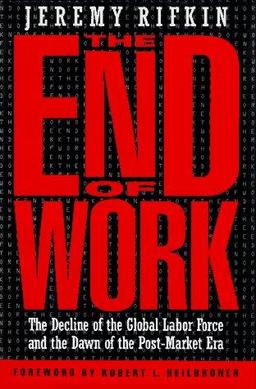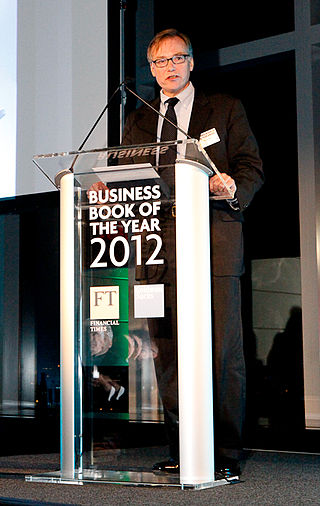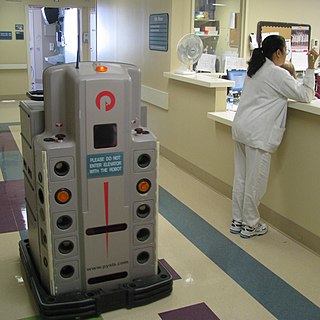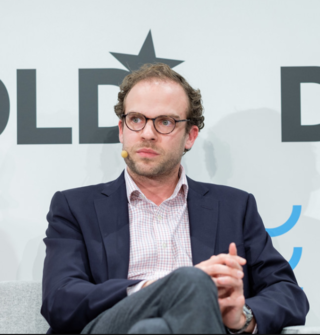The technological singularity—or simply the singularity—is a hypothetical future point in time at which technological growth becomes uncontrollable and irreversible, resulting in unforeseeable consequences for human civilization. According to the most popular version of the singularity hypothesis, I. J. Good's intelligence explosion model, an upgradable intelligent agent will eventually enter a "runaway reaction" of self-improvement cycles, each new and more intelligent generation appearing more and more rapidly, causing an "explosion" in intelligence and resulting in a powerful superintelligence that qualitatively far surpasses all human intelligence.

Barbara Ehrenreich was an American author and political activist. During the 1980s and early 1990s, she was a prominent figure in the Democratic Socialists of America. She was a widely read and award-winning columnist and essayist and the author of 21 books. Ehrenreich was best known for her 2001 book Nickel and Dimed: On (Not) Getting By in America, a memoir of her three-month experiment surviving on a series of minimum-wage jobs. She was a recipient of a Lannan Literary Award and the Erasmus Prize.
Post Fordism is a term used to describe the growth of new production methods defined by flexible production, the individualization of labor relations and fragmentation of markets into distinct segments, after the demise of Fordist production. It was widely advocated by French Marxist economists and American labor economists in the 1970s and 1980s. Definitions of the nature and scope of post-Fordism vary considerably and are a matter of debate among scholars.

Rodney Allen Brooks is an Australian roboticist, Fellow of the Australian Academy of Science, author, and robotics entrepreneur, most known for popularizing the actionist approach to robotics. He was a Panasonic Professor of Robotics at the Massachusetts Institute of Technology and former director of the MIT Computer Science and Artificial Intelligence Laboratory. He is a founder and former Chief Technical Officer of iRobot and co-Founder, Chairman and Chief Technical Officer of Rethink Robotics and currently is the co-founder and Chief Technical Officer of Robust.AI.

An AI takeover is a scenario in which artificial intelligence (AI) becomes the dominant form of intelligence on Earth, as computer programs or robots effectively take control of the planet away from the human species. Possible scenarios include replacement of the entire human workforce due to automation, takeover by a superintelligent AI, and the popular notion of a robot uprising. Stories of AI takeovers are popular throughout science fiction. Some public figures, such as Stephen Hawking and Elon Musk, have advocated research into precautionary measures to ensure future superintelligent machines remain under human control.
Structural unemployment is a form of involuntary unemployment caused by a mismatch between the skills that workers in the economy can offer, and the skills demanded of workers by employers. Structural unemployment is often brought about by technological changes that make the job skills of many workers obsolete.
Reserve army of labour is a concept in Karl Marx's critique of political economy. It refers to the unemployed and underemployed in capitalist society. It is synonymous with "industrial reserve army" or "relative surplus population", except that the unemployed can be defined as those actually looking for work and that the relative surplus population also includes people unable to work. The use of the word "army" refers to the workers being conscripted and regimented in the workplace in a hierarchy under the command or authority of the owners of capital. In Sociology, the term was coined to refer to a group of people who are employed only when they are needed or when the economy is booming only to be put out of work when circumstances change.
Emerging technologies are technologies whose development, practical applications, or both are still largely unrealized. These technologies are generally new but also include older technologies finding new applications. Emerging technologies are often perceived as capable of changing the status quo.
"The Triple Revolution" was an open memorandum sent to U.S. President Lyndon B. Johnson and other government figures on March 22, 1964. It concerned three megatrends of the time: increasing use of automation, the nuclear arms race, and advancements in human rights. Drafted under the auspices of the Center for the Study of Democratic Institutions, it was signed by an array of noted social activists, professors, and technologists who identified themselves as the Ad Hoc Committee on the Triple Revolution. The chief initiator of the proposal was W. H. "Ping" Ferry, at that time a vice-president of CSDI, basing it in large part on the ideas of the futurist Robert Theobald.

Window cleaning, or window washing, is the exterior cleaning of architectural glass used for structural, lighting, or decorative purposes. It can be done manually, using a variety of tools for cleaning and access. Technology is also employed and increasingly, automation.

The End of Work: The Decline of the Global Labor Force and the Dawn of the Post-Market Era is a non-fiction book by American economist Jeremy Rifkin, published in 1995 by Putnam Publishing Group.

Financial Times Business Book of the Year Award is an annual award given to the best business book of the year as determined by the Financial Times. It aims to find the book that has "the most compelling and enjoyable insight into modern business issues". The award was established in 2005 and is worth £30,000. Beginning in 2010, five short-listed authors each receive £10,000, previously it was £5,000.

Technological unemployment is the loss of jobs caused by technological change. It is a key type of structural unemployment. Technological change typically includes the introduction of labour-saving "mechanical-muscle" machines or more efficient "mechanical-mind" processes (automation), and humans' role in these processes are minimized. Just as horses were gradually made obsolete as transport by the automobile and as labourer by the tractor, humans' jobs have also been affected throughout modern history. Historical examples include artisan weavers reduced to poverty after the introduction of mechanized looms. During World War II, Alan Turing's bombe machine compressed and decoded thousands of man-years worth of encrypted data in a matter of hours. A contemporary example of technological unemployment is the displacement of retail cashiers by self-service tills and cashierless stores.
Economists refer to the polarization of the labor force when middle-class jobs—requiring a moderate level of skills, like autoworkers’ jobs—seem to disappear relative to those at the bottom, requiring few skills, and those at the top, requiring greater skill levels. The structure of job opportunities in the United States has sharply polarized over the past two decades, with expanding job opportunities in both high-skill, high-wage occupations and low-skill, low wage occupations combined with contracting opportunities in middle-wage, middle-skill white-collar and blue-collar jobs. Although this has contributed to the rise of income inequality in the U.S. it is a minor factor compared to the relatively rapid rise in income and wealth by the top 1%. Employment and economic polarization is widespread across industrialized economies; it is not a uniquely American phenomenon. Over the past decades, wage gains were also polarized, with modest gains at the extremes and smaller gains in the middle. A good description of polarization in Great Britain is one of the first uses of the term, economic polarization.

Richard E. Baldwin is a professor of international economics at the IMD Business School and emeritus professor of international economics at the Geneva Graduate Institute of International and Development Studies. He was the former President of the Centre for Economic Policy Research (CEPR). He is Editor-in-Chief of VoxEU, which he founded in June 2007. He is a research associate at the National Bureau of Economic Research and was twice elected as a Member of the Council of the European Economic Association. Baldwin has been called "one of the most important thinkers in this era of global disruption".
Existential risk from artificial general intelligence is the idea that substantial progress in artificial general intelligence (AGI) could result in human extinction or an irreversible global catastrophe.

Martin Ford is an American futurist and author focusing on artificial intelligence and robotics, and the impact of these technologies on the job market, economy and society.
Job creation and unemployment are affected by factors such as aggregate demand, global competition, education, automation, and demographics. These factors can affect the number of workers, the duration of unemployment, and wage rates.

Carl Benedikt Frey is a Swedish-German economist and economic historian. He is the Dieter Schwarz Associate Professor of AI & Work at the Oxford Internet Institute and a Fellow of Mansfield College, University of Oxford. He is also Director of the Future of Work Programme and Oxford Martin Citi Fellow at the Oxford Martin School.
A robot tax is a legislative strategy to disincentivize the replacement of workers by machines and bolster the social safety net for those who are displaced. While the automation of manual labour has been contemplated since before the industrial revolution, the issue has received increased discussion in the 21st century due to newer developments such as machine learning.










